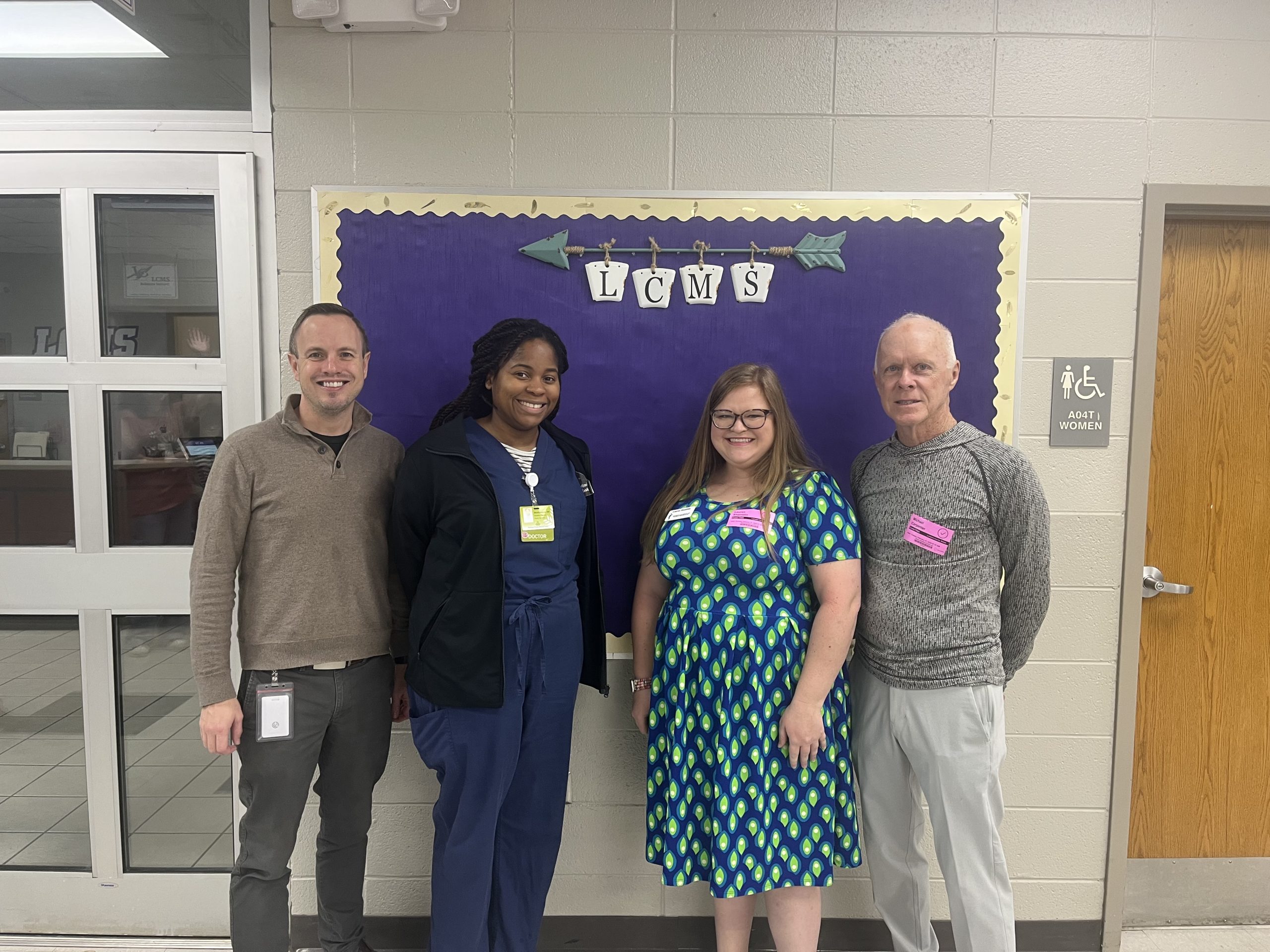The Georgia Healthy Family Alliance (GHFA) awarded Community Health Grant Award applicants $50,000 in first cycle 2024 grants. Grant awards were made to GAFP member-sponsored community groups that support GHFA program priorities including underserved populations and programs that promote healthy practices. The application deadline for second cycle grants is May 14, 2024. Visit www.georgiahealthyfamilyalliance.org/grants/ for more information or to apply. First cycle 2024 Community Health Grant recipients are:
Emory School of Medicine “Emory Farmworker Project”
Thien-Kim Le, MD -South Georgia
$5,000
The Emory Farmworker Project began in 1996 with a small group of Emory physician assistant students interested in rural medicine and providing care to the underserved community of migrant farmworkers in South Georgia. Today, the project provides free medical care to 2000+ migrant farmworkers and their families each year. This population faces many barriers to access care, including their income, work schedule and conditions, and lack of transportation. Volunteer staffconsistently sees hundreds of patients with musculoskeletal complaints each year. GHFA funds will allow for expansion of musculoskeletal treatments with 300 additional patients receiving treatment through the purchase of diclofenac gel, braces, splints and sleeves.
MercyMed Columbus “Expanding Access To Affordable Primary Healthcare in West Georgia”
Sarah Barr, MD -Columbus
$5,000
MercyMed of Columbus requests support for Mission Columbus clinic, which ensures primary care access for a severely underserved neighborhood in Columbus, Georgia. Residents living near the Mission Columbus clinic face significant healthcare barriers that have impacted the quality and length of their lives. Sadly, clinic neighbors live an average of 11 years less than Columbus residents living just a few miles away. Since adding staff and completing a major renovation in April 2023, MercyMed has been able to provide 47% more primary care visits at Mission Columbus, ensuring greater healthcare access and improved health for more underserved neighbors. Georgia Healthy Family Alliance grant support will be used to provide up to 5,800 primary care visits for 3,220 children and adults at Mission Columbus clinic during the project period.
Grace Village Medical Clinic “Refugee Clinic”
Scott Keller, DO – Dekalb County
$5,000
Grace Village Medical Clinic serves a low-income, uninsured refugee and immigrant population whose conditions can lead to severe outcomes if left unmanaged. Refugees are given only eight months of Medicaid after which most are uninsured with limited income. Grace Village patients comprise 54 nationalities, 150 ethnic groups and speak 47 languages. The clinic sees 1500-2000 new refugees per year and many are in ill health. Grace Village Medical Clinic provides free Doctors, Nurse Practitioners, Physicians Assistants, Nurses, Physical Therapists and Behavioral Therapists. The clinic also provides free prescription and over-the-counter medications and free laboratory testing. GHFA funding will be used to purchase needed medications including Albuterol inhalers, OTC diclofenac gel and others.
MHUMC/HCA Family Medicine Clinic “Prolotherapy Injections Access for Chronic Musculoskeletal Conditions in the Underserved”
Sydney Koenig, MD -Savannah
$5,000
MHUMC/HCA Clinic patients have limited options available for the treatment of osteoarthritis and overuse musculoskeletal conditions due to insurance barriers regarding approvals for therapy, medications, and injections such as viscosupplementation. In addition, for patients with morbid obesity, surgical options for osteoarthritis are limited due to concerns with implant failures. Dextrose prolotherapy is a novel injectable therapy that has been studied in both intra-articular and extra-articular applications and demonstrated success for osteoarthritis and overuse tendonopathies. The clinic has approved the use of dextrose prolotherapy; however, since this injection is not covered by insurance, patients have an out-of-pocket cost for the procedure. GHFA grant funds will help offset costs for this injectable therapy for patients thereby improving their pain, function, and quality of life when other options have failed or are not available.
Augusta University, “Free Dermatology Student Clinic Support and Expansion”
Michael Arnold, Medical Student – Augusta
$5,000
The Free Dermatology Clinic is a medical student-organized dermatology clinic that operates as a part of the Asociación Latina de Servicios del CSRA (ALAS) clinics serving those who are underinsured, uninsured, and living 200% below the poverty level. The clinic operates under the guidance of experienced volunteer dermatologists and pharmacists who supervise and mentor participating medical students, physician assistant students, and other medically qualified volunteers to provide the highest quality care to those who would not normally be able to access it. Grant funding will be used for equipment to appropriately evaluate patients including molescopes, surgical supplies for biopsies, and other bedside procedures. Funds would also be allocated to provide financial assistance to cover the costs of any necessary patient labs and prescriptions.
Floyd Foundation, “Youth Mental Health Initiative for Floyd County Public Elementary & Middle Schools”
James Collins, MD – Rome
$5,000
Floyd Healthcare Foundation recognizes the importance of mental wellness for both youth and adults and is launching a mental health initiative in local school systems, providing Positive Action curriculum to all elementary and middle schools in Rome City and Floyd County public schools, over 7,000 students, during the 2024-2025 school year. Positive Action is taught at every level of learning: cognitive, affective, and behavioral and brings the power of positiveness to participants so potential is reached and barriers are removed. Additionally, Positive Action provides youth the vocabulary and an understanding to communicate their emotions. The curriculum is also helpful to educators in teaching and discussing mental health and recognizing the need for interventions and clinical support. (It is different from the PBIS system.) GHFA funds will be used to purchase140 lessons for elementary grades with posters, music, activity sheets/booklets and other hands-on materials for facilitators.
“Improving Access To Primary Health Care With Medical Interpretation Services”
Andrew Kim, MD – Clarkston
$5,000
Over half of Clarkston residents were born outside the United States and one-quarter have limited English proficiency. This cultural and linguistic diversity creates significant healthcare access barriers – leading to low utilization of preventive services, unmanaged acute conditions, low medication and treatment plan adherence, and unmanaged chronic conditions. Ethne Clinic’s medical interpretation service ensures all Clarkston-area residents can receive high-quality primary care in their preferred language. Increased patient numbers and a higher percentage of patients with limited English proficiency have significantly increased usage of Ethne’s medical interpretation service. From September through November 2023, Ethne provided an average of 6,000 interpretation minutes per month – up from the 3,031 per month average in the prior year. GHFA funds will provide an estimated 5,600 medical interpretation calls (totaling 67,000 minutes) in more than 40 languages during the project period.
“Mercer University School Medicine Food Pantry”
Alice House, MD -Columbus
$5,000
The Mercer University School of Medicine Food Pantry began in January 2024. It is a stop-gap measure for students, faculty, and staff who need to supplement their food supply while waiting for their subsequent financial aid reimbursement or paycheck (whichever the case) on all Mercer School of Medicine campuses. The food pantry is also available to serve constituents when they cannot shop for food due to lack of time or are at school late at night without food. Due to the limited internal budget for this project, funding is needed to cover additional food items, cabinets to store the food, and staff to maintain the pantry on each Mercer campus.
Our House Integrated “Whole-Health Services for Underserved Children and Adults”
Beverly Taylor, MD -Atlanta
$5,000
Our House Health is the community healthcare programming of Our House Inc., an Atlanta homeless services nonprofit. Our House Health provides essential physical and mental healthcare services for around 2,500 medically underserved patients annually, most of whom are experiencing homelessness. Our House advances patients’ health and wellbeing by addressing the social drivers of health with care coordination, integrating with other Our House’s programs and connecting patients with permanent medical homes for long-term access to care.
GHFA funding will support the cost of prescriptions, transportation assistance for patients who lack access to reliable transportation to access the clinic, lab service fees to complete needed laboratory work for patients, and language interpretation services to provide necessary on-site language interpretation for patients.
“Harvesting Hope: Addressing Mental Health Disparities Among SE Georgia’s Migrant Farmworker Community”
Susana Alfonso MD – Southeast Georgia
$5,000
The “Harvesting Hope” project, spearheaded by the Emory Department of Family and Preventive Medicine Behavioral Medicine Program, endeavors to address mental health disparities among Southeast Georgia’s migrant farmworker community. Migrant farmworkers in Southeast Georgia confront significant psychosocial stressors and mental health/substance use issues, compounded by limited access to resources. Based on assessments from 2023, an estimated 35% of migrant farmworkers who presented for physical health conditions also needed targeted mental health interventions. Despite Emory University’s sponsorship, the program relies entirely on self-funding, primarily through donations.
This GHFA grant is pivotal for enhancing mental health services for migrant farmworkers, specifically allocating funds for Behavioral Medicine trainee and translator participation. The grant will support continuing education, mental health translator training, curriculum development and the dissemination of project information.




